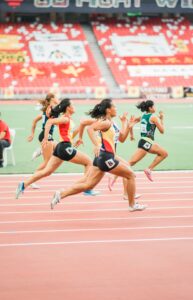Megan Geall
British sprinter Dina Asher-Smith has been praised for talking about her period after pulling up in the women’s 100m final at the European Championships in Munich. Normally a social taboo, Asher-Smith simply claimed that the calf cramp which ruined her chances at gold was down to “girl stuff”.
Watch the moment Dina Asher-Smith pulls up in the 100m final here.
Periods in Sport
We’ve all been there: it’s your time of the month, your hormones are all over the place, your tummy is cramping like crazy, and all you really want—and deservedly will—do is lie on the sofa and demolish a bar of chocolate. However, professional athletes don’t get this privilege; with training schedules, travelling and competitions constantly part of their routine, it is pretty much impossible to avoid exercising while on their period.
“period symptoms such as muscle cramps, fatigue, and mood swings could impact overall performance”
Athletes are simply expected to compete on their periods (wearing knicker-size shorts nonetheless) so it is no surprise that period symptoms such as muscle cramps, fatigue, and mood swings could impact overall performance.
That is why Dina Asher-Smith is now calling for more scientific research into the effect of periods on athletic performance after it cost her a medal and the European title.
Lack of Research
More and more women are taking up sport, both at professional and amateur levels. However the majority of research in sports science is conducted by men and completed on male research participants too. Simply put, studying women in sport is more expensive due to “fluctuating hormones” that pose a “physiological variable” to scientists.

Shockingly, in sport science “women accounted for only three percent of participants”. Generalised medical treatment and sport science research has left many areas of training, potential injuries, and recovery for women uncovered.
Dina’s comments on periods
After qualifying for the final with an impressive time, it was a shock to watch the sprinter pull up, leading to many questions rising about her performance.
“‘I feel if it was a men’s issue there would be a million different ways to combat things.'”
“It was just ‘girls stuff’,” Asher-Smith stated. “It’s just frustrating. It’s one of those things. It’s a shame because I’m in really good shape and I was looking to come and run fast”.
“People don’t always talk about it… if it was a men’s issue we’d have a million different ways to combat things”
GB sprinter Dina Asher-Smith calls for more period sports science after her menstrual cycle causes her to pull up with cramp in 100m finalhttps://t.co/hWvN8pOXnX pic.twitter.com/ZcFCthifp9
— BBC News (UK) (@BBCNews) August 19, 2022
The 26 year-old national record-holder urged sporting bodies to provide more funding for research into periods and women in sport.
“Sometimes you see girls that have been so consistent and there’s a random dip and behind the signs they’ve been really struggling” Asher-Smith suggests. “So we could just do with more funding. I feel if it was a men’s issue there would be a million different ways to combat things”.
Teammates support calls for research on periods
After qualifying fastest for the women’s 4X100m relay final in Munich, British sprinter Imani-Lara Lansiquot also spoke out about periods—also stating that she was currently competing while menstruating.
“‘The side-effects of all the medication you can take are still really unknown.'”
“I still think it’s quite shocking that it’s a taboo” Lansiquot said. “I’m sure all of us have gone through it at some point but we’ve still not even said anything to each other because it feels like a massive taboo that isn’t discussed”.
While there are methods of controlling when you menstruate via taking the contraceptive pill, Lansiquot also raised the point that it is not always that simple as “the side-effects of all the medication you can take are still really unknown”.
Another member of the relay team, Ashleigh Nelson, also spoke out about taking the pill.

“There are things you can take to postpone your period but they also have side-effects so you’re in a Catch-22” Nelson suggested before stating, “you can’t win”.
While the athletic mindset allows Asher-Smith to brush off this loss and focus on the future, her and her teammates have been praised for raising such an important conversation. Calling for more research and funding that will allow athletes an understanding of how their bodies work on their periods and how they can optimise their training routines is a necessary step in making the sports world equal.
Featured image courtesy of Thomas Walter on Pixabay. No changes were made to this image. Image license can be found here.

